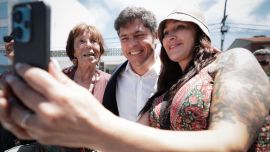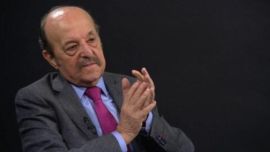If somebody gives you a Rubik’s Cube for Christmas, you can take it for granted that, though it may look fiendishly difficult, with a bit of effort it really can be solved. If it turns out that the puzzle you got was designed to be unsolvable, you will have been the victim of a senseless practical joke and would be entitled to sue whoever was responsible for selling it.
By now, this must be what the world’s top economists and political scientists feel when they are asked to take another look at Argentina and say what in their view should be done to get her out of her death spiral. Though it can be assumed that, despite rumours to the contrary, all of them, including the International Monetary Fund technocrats, would dearly like to come up with a programme which would put an end to the country’s endless travails so at long last it could play a positive role in world affairs, few will be willing to waste valuable time offering advice to politicians who, after agreeing with them, will go back to business as usual. As far as most are concerned, Argentina is an example of what happens to countries which let themselves be run by charlatans.
At first sight, the problem looks fairly simple. Argentina has plenty of material resources, a fair amount of human capital and is not surrounded by predatory foreign enemies, so getting her moving in the right direction should be far easier than in most underdeveloped countries. However, encouraged by politicians, progressive intellectuals, clergymen and social justice activists who make a tidy living by demanding more handouts for their followers, most people think they deserve far more than the economy will be able to give them for years to come.
In other parts of the world, this would mean that until further notice the country’s governments would concentrate on increasing production, boosting foreign trade and, while about it, slimming down an extraordinarily obese public sector which is used as a sponge to absorb unemployment. This, broadly speaking, is what spokespeople for the Juntos por el Cambio coalition say they would like to do if given the chance but, as they are well aware, in this part of the world economic logic parted company from political logic many years ago. Unless they are brought closer together, the country will continue to slide downhill at an accelerating rate.
As things stand, a reasonable, middle-of-the-road, vaguely social-democratic economic policy which remained in touch with reality would be angrily repudiated by much of the political elite. With his softly-softly “gradualist” strategy, Mauricio Macri did try something like this but, instead of praising him for his willingness to keep spending a huge amount of public money on social welfare, his political foes treated him as a wild right-wing neoliberal who was determined to starve most of his compatriots. Since he left office, the situation has gotten far worse.
On returning to power a couple of years ago the Kirchnerites, who evidently take their own propaganda very seriously indeed, imagined that without Macri the economy would immediately start growing fast enough for it to leave all its many problems behind. They would achieve this by filling the pockets of poorer folk with freshly printed banknotes so they could go out and consume, which would help local manufacturers and tradesmen who would have no need to increase prices. Even before the Covid pandemic arrived, it was clear that the possibility of such a policy working was about zero. To make matters worse, thanks to their unlovely reputation the Kirchnerites scared away the investors that Argentina desperately needed to attract, which is why many businessmen, accompanied by droves of enterprising young people, have decided they would be well advised to hotfoot it either to Uruguay or, if so inclined, to places like Miami. Their departure has made the country’s outlook even gloomier than it was before.
After playing a leading role in politics for 20 years, it would seem that the Kirchnerite version of Peronism is finally on the way out. The consensus is that this is what the results of the recent parliamentary elections told us. For understandable reasons, Kirchnerite politicians – starting with their den mother Cristina Fernández de Kirchner who has been plausibly charged with crimes that, if they finally do get through the country’s slow-motion judicial system, could put her and her son Máximo behind bars or send them both into exile – reacted with dismay to their defeat. Though less ostentatiously, so too did many opposition leaders who, to their alarm, suddenly found themselves expected to provide solutions for Argentina’ economic woes.
This was not because Cristina had just come up with a strange new doctrine according to which the opposition should take full responsibility for dealing with problems she accused them of causing, but because they knew they could soon be back in government. For many of them, it is a frightening prospect. While it is easy for opposition leaders to criticise the Kirchnerites for their handling of the economy and a great many other things, coming clean about what they themselves would do to rein in inflation, reduce public spending and give farmers and others incentives to produce more is far more difficult because, for a time, it would mean taking money from people who are already terribly hard up and, in effect, handing it others who are relatively better off.
In some countries in some circumstances, such as those of Japan and Germany in the aftermath of World War II, most people may be willing to resign themselves to such a manifestly unfair policy because the alternatives looked even grimmer, but Argentina’s disastrous condition is not the result of defeat in a world-shaking conflict but of the ruling class’s fondness for the apparently painless quick fix, a preference which is shared by the Radicals who would like to take over Juntos por el Cambio. As the IMF well knows, for a future government to press on with a genuinely realistic economic programme of the kind most outsiders think Argentina needs, it would have to be explicitly supported by much of the political establishment, but neither the opposition nor the assortment of groups currently in power has any appetite for drastic measures. On the contrary, the leaders of both coalitions are doing whatever they can to make their enemies pay most of the steep “political costs” of whatever is eventually done, thereby creating a power vacuum which, sooner or later, the market will fill.



















Comments